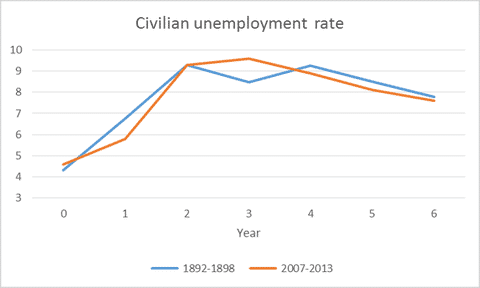Paul Krugman: “Both Steve Benen and Ed Kilgore get annoyed at fellow journalists complaining that there aren’t any “new ideas” in Obama’s latest. But why should there be?
It was clear early on that this was a crisis very much in the mold of previous financial crises.”
Well, sort of, but not really. True, the USA population had filled up to the rim in subprime mortgages, and could not afford anymore. True, the USA population ignore both mathematics and the fact that big bankers can conspire, big time (in jacking up interest rates after mortgages had been acquired: ARMs; or through securitization, selling lies to the unawares; or by hyper leveraging themselves against all of society through financial derivatives). Result? A Great Depression, probably the greatest of them all.
What triggered the crisis, though was a spectacular rise in the price of oil. People suddenly had to choose between paying for the house, or fueling the car. As the USA is car dependent, it was not really a choice: without a functioning car, there is no getting to work, or even food, let alone school.
Moreover, ever since, in spite of frantic fracking, the price of oil has stayed high in the USA, depression or not. California gets most of its oil from Texas now. It’s back to the past. Except for one important detail: all of this oil is fracked oil.
Now please observe that the world economy, and world food production, let alone trade, is completely oil dependent. Without oil, the world population would quickly collapse by 90%.
We do not have an acceptable mass energy replacement. We are in the situation of Europe (and Japan!) in 1300 CE: dependent upon a waning asset (then, wood, which was used for everything; although England switched to coal then).
So what’s the idea? The big idea is always missing from the loud economists who dominate the USA, and, thus, the world in general: they view the economy as just about money flow. According to them, if money flows, everything is fine (never mind all the money goes to the .1%!).
This was basically the reasoning Roman emperors wanted their economists to believe, and advocate, too. So I sent the following to Krugman who published it right away:
“What is new in present day economics is the possibilities new technologies offer that were not within reach before, and the problems old technologies are causing, as they become waning assets.
We are living in a science-fiction world, highly dependent on technology. Not to realize this is a lethal condition.”
To this, John from Hartford replied:
“I’m not sure this is true. If you look at the period in the 20′s and 30′s when people like Keynes were evolving their theories the world was being flooded with new technologies like radio, mass ownership of automobiles, silent/sound movies, aircraft, proto computers, etc. etc. which were probably greater in their affects than those were currently undergoing. What was much more important was that it was a period of intense global economic disruption which essentially provided real life laboratories for examining and testing economic hypotheses. And back then the consequences of economic mismanagement really were lethal on a scale we’ve never experienced since.”
In turn I answered to this very conventional reply with more of my advanced details (a condensed version of which was published by the NYT):
John: I do not dispute that the flood of new technologies getting in everyday life in the 1930s was not higher. Right now such a flood is very high in China. Yet, the technological flow has been deliberately slowed down in the West by a plutocratic conspiracy (as happened in Rome, when the government consciously paid inventors to NOT develop their inventions).
As I have explained in the past, plutocrats hate disruptive technologies. New technology introduces new ideas (witness the so called “Arab Spring”). It’s only natural to apply the “new ideas” mood to the established (plutocratic) order, as plutocrats and plutophiles, correctly, fear.
An example of technology not deployed is single payer health care in the USA (Germany introduced one more than 150 years ago!). Instead Obama introduced a new technology, Obamacare, friendly to plutocrats like the old one, but with even more subsidies from taxpayers. (For what the word “technology” means, see the comments.)
I just said the possibilities of higher technological disruption exists now. and that’s a good thing. And that proper economics, well done, would look into disrupting for the best the established economic order. At the governmental level (and not, as is done now, just at the Bill Gates level!. Bill Gates is financing new nuclear technologies.).
To claim, as Hartford John does, that “the consequences of economic mismanagement really were lethal on a scale we’ve never experienced since” is saying that devastating the entire machinery of the biosphere on a planetary scale is not “economic mismanagement”.
As I have long argued, we are in much more global danger now than in the 1930s. Fascism in Europe and Japan in the 1930s was a man-made disaster. Now we have much greater disasters waiting in the wings, driven not by human maniacs, but by physics, such a methane belch (that could turn overnight global warming into global heating!). ‘Massive methane eruptions’ is not a question of “if”, but WHEN.
Massive methane belching is actually already happening, in my not so humble opinion. How else to explain that the North Siberian sea route (“North East Passage”) is already now open for business? The topography makes it possible for much more methane to erupt there than in the North West passage. as observed!
(An interesting aside is that Total is investing many billions in a gas liquefaction plant along the Siberian shore, obviously expecting the melting of the ice to accelerate! The idea is to send the liquefied. methane to China; Putin said it was OK with him, and he would remove the Gazprom monopoly.)
More prosaically, the ROI (Return On Investment) of fossil fuels is going badly, and the search for new mass energy is reaching emergency levels (however new energy technologies cannot be invented from one decade to the next!)
Europe knew a comparable situation twice: in the Late Roman empire, and then around 1300 CE. In the former case, civilization nearly crashed. In the latter case, European governments took successful, but drastic, measures (yet population collapsed by 2/3).
The only obvious new, potentially massive, technology we have is nuclear energy. By “nuclear energy” I mean all imaginable fission (there are about 100 of these) and fusion technologies. some will scoff. Yet, by 1330 CE, England had switched to coal to such an extent that Edward III’s government had to pass laws against coal, to limit the pollution of London.
This energy independence may help to explain that ‘England” was winning the war against “France” (for want of a better word) for a century. (Until the southern French developed the world’s first field artillery.) The abundance of coal with high ROI certainly explains the economic ascendency of England for the next six centuries. Until the age of oil. Oil with high ROI was in the USA, Arabia, and Mesopotamia.
Right now, many of the conventional, ignorant ecologists are certainly culprit not just of the impending ecological collapse, but also of the present depression. Jim Hansen, the ex-NASA scientist who did more than anybody else to provide the world with catastrophic insight on the degradation of the biosphere, shares this opinion:
“Can renewable energies provide all of society’s energy needs in the foreseeable future? It is conceivable in a few places, such as New Zealand and Norway. But suggesting that renewables will let us phase rapidly off fossil fuels in the United States, China, India, or the world as a whole is almost the equivalent of believing in the Easter Bunny and Tooth Fairy.
I think the only hope we have of phasing down emissions and getting to the middle of the century with a much lower level of fossil fuel emissions – which is what we will have to do if we want young people to have a future – we’re going to have to have alternatives and at this time nuclear seems to be the best candidate.”
Screaming against first generation, 1950s nuclear reactors, as those in Japan is entirely justified. The Japanese reactors use French-made recycled MOX for fuel. But for that, they are time-wraps. Let alone carefully installed in the way of a 30 meters (100′) tsunami. that had already happened 12 centuries before.
By now Fourth and Fifth, super-safe, super-efficient fission reactors should have been massively deployed. But the research was carefully not funded, because the reigning political class is fossil fuel fueled.
Survival, not just the economy, is all about energy.
Patrice Ayme.






